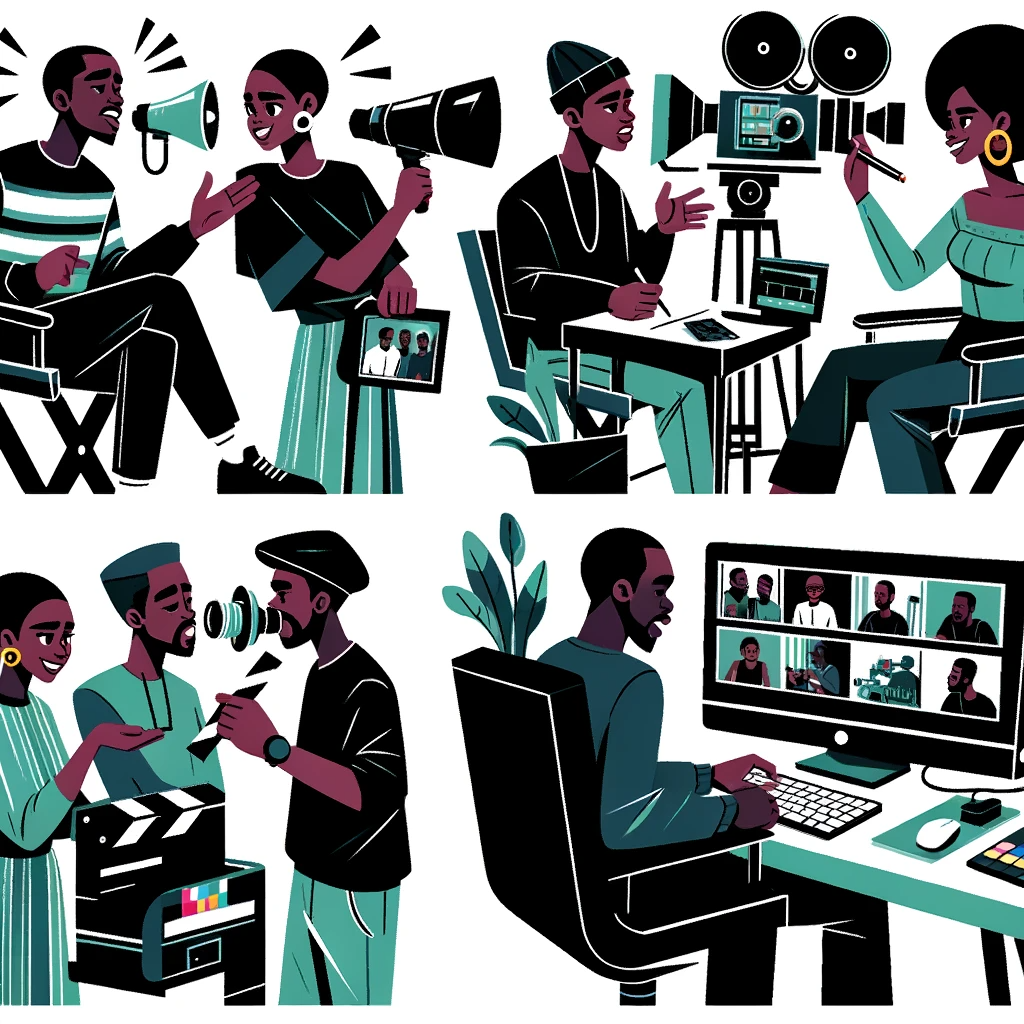Table of Contents
Directing is not just about shouting “Action!” and “Cut!” on set — though, yes, you will do plenty of that. It’s about building an emotional roadmap for your story, steering a whole crew toward one goal: telling a tale that moves people.
In Nollywood, where our stories are often layered with tradition, family tension, spiritual complexity, and contemporary fire, directing takes both vision and wisdom. You’re not just managing a set — you’re interpreting culture, guiding performances, solving problems, and translating the invisible into the visible.
This guide is for the rising Nigerian director who wants to lead with clarity, create with purpose, and bring unforgettable stories to life.
Understanding the Director’s Role in Nollywood
The director is the creative captain of the film. You work with everyone — the writer, cinematographer, actors, production designer, editor — to shape the final film.
In Nollywood’s fast-moving, sometimes chaotic environment, the director often plays multiple roles: part storyteller, part negotiator, part therapist, part emergency fixer.
You are responsible for:
- Interpreting the script into a visual and emotional experience
- Shaping actor performances to feel grounded and real
- Collaborating with the cinematographer on shot choices
- Maintaining a consistent tone and style
- Keeping production moving despite constraints (and there will be plenty)
A good director doesn’t just execute scenes — they elevate them.
Developing Your Directorial Vision
Your vision is your fingerprint. It’s what makes your version of a story different from someone else’s.
Start by asking:
- What’s the heart of this story?
- How should it feel — gritty, mystical, intimate, epic?
- What kind of visual language fits this story best?
- What emotions should the audience walk away with?
Think of Kunle Afolayan’s atmospheric approach in The Figurine or the way Jade Osiberu uses power and tension in Gangs of Lagos. Their choices — color palettes, shot pacing, character focus — all reflect intentional vision.
Vision doesn’t mean fancy. It means specific.

Directing on a Nollywood Set: Craft Meets Hustle
Nollywood sets are unlike any other — we move fast, we improvise when needed, and we get things done, even when the light is going and the generator is coughing.
But craft still matters.
Preparing for Production
Don’t show up on set without knowing your script inside out. Spend time in pre-production:
- Break down the script scene by scene
- Plan your shot list and storyboards (even rough sketches help)
- Rehearse with actors where possible
- Scout locations ahead of time
- Collaborate with your DOP and Production Designer on look and feel
When prepped well, even a low-budget shoot can shine.
Working with Actors
This is one of your most delicate jobs. Nigerian actors are talented, but they need direction with trust.
Give them context, not control. Instead of saying, “Cry here,” say, “This is where your character realizes her mother betrayed her — how would she react?”
Build performances that feel true, not forced.
Staying Flexible on Set
Things will go wrong. Locations may change last minute. A generator might blow. Rain may fall in a dry season scene. Welcome to Nollywood.
The key? Stay calm. Adjust, adapt, and stay focused on the story. The best directors know when to pivot without losing the heart of the film.
Finding Your Style and Signature
Your style will develop over time, but start paying attention to what pulls you.
- Do you love long takes or quick edits?
- Do you prefer natural lighting or stylized visuals?
- Do you lean toward realism, or do you love the surreal?
Mildred Okwo (The Meeting) favors strong character interactions and clean, composed scenes. CJ Obasi (Mami Wata) blends folklore with striking visuals. You don’t have to copy anyone — but you must study others as you find your own rhythm.
Building Your Directing Career in Nigeria
Start Small, Think Big
Shoot short films. Direct scenes with friends. Work as an assistant director to learn the ropes. The goal is to build experience — and a reel that shows what you can do.
Collaborate with Writers and Producers
Many of Nollywood’s best films come from tight creative partnerships. Find your people: writers who get your voice, producers who believe in your vision, DOPs who push you technically.
Film Festivals and Distribution
Even a brilliant film won’t matter if no one sees it. Submit your work to:
- Africa International Film Festival (AFRIFF)
- Durban International Film Festival
- AMAA, AMVCA, and more
Use these platforms to network, learn, and grow visibility. Don’t ignore YouTube, Showmax, and other online platforms either — many Nigerian directors are building global audiences one stream at a time.
Final Thoughts
Directing in Nollywood is no small feat — it takes courage, patience, and an eye for both beauty and truth. You’ll face setbacks, but you’ll also witness the magic of creating something from nothing. Something that moves people. Something that lasts.
So prepare well. Listen deeply. Be kind to your crew. Protect your actors. Learn from every project — even the ones that fail.
And above all, stay connected to WHY you’re telling stories in the first place.
Nigeria has thousands of stories waiting to be told. One of them might be yours.















Leave a comment